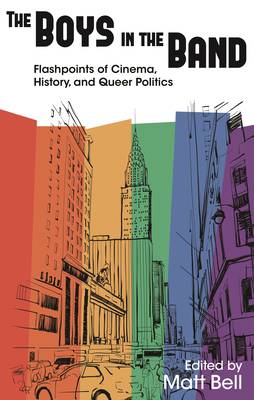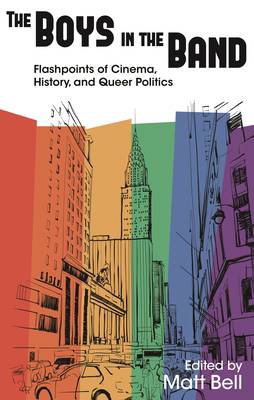
- Retrait gratuit dans votre magasin Club
- 7.000.000 titres dans notre catalogue
- Payer en toute sécurité
- Toujours un magasin près de chez vous
- Retrait gratuit dans votre magasin Club
- 7.000.000 titres dans notre catalogue
- Payer en toute sécurité
- Toujours un magasin près de chez vous
Boys in the Band
Flashpoints of Cinema, History, and Queer Politics
Description
The Boys in the Band's debut was revolutionary for its fictional but frank presentation of a male homosexual subculture in Manhattan. Based on Mart Crowley's hit Off-Broadway play from 1968, the film's two-hour running time approximates real time, unfolding at a birthday party attended by nine men whose language, clothing, and behavior evoke a range of urban gay "types." Although various popular critics, historians, and film scholars over the years have offered cursory acknowledgment of the film's importance, more substantive research and analysis have been woefully lacking. The film's neglect among academics belies a rich and rewarding object of study. The Boys in the Band merits not only the close reading that should accompany such a well-made text but also recognition as a landmark almost ideally situated to orient us amid the highly complex, shifting cultural terrain it occupied upon its release--and has occupied since.
The scholars assembled here bring an invigorating variety of methods to their considerations of this singular film. Coming from a wide range of academic disciplines, they pose and answer questions about the film in remarkably different ways. Cultural analysis, archival research, interviews, study of film traditions, and theoretical framing intensify their revelatory readings of the film. Many of the essays take inventive approaches to longstanding debates about identity politics, and together they engage with current academic work across a variety of fields that include queer theory, film theory, gender studies, race and ethnic studies, and Marxist theory. Addressing The Boys in the Band from multiple perspectives, these essays identify and draw out the film's latent flashpoints--aspects of the film that express the historical, cinematic, and queer-political crises not only of its own time, but also of today.
The Boys in the Band is an accessible touchstone text in both queer studies and film studies. Scholars and students working in the disciplines of film studies, queer studies, history, theater, and sociology will surely find the book invaluable and a shaping influence on these fields in the coming years.
Spécifications
Parties prenantes
- Editeur:
Contenu
- Nombre de pages :
- 320
- Langue:
- Anglais
- Collection :
Caractéristiques
- EAN:
- 9780814341537
- Date de parution :
- 01-12-16
- Format:
- Livre broché
- Format numérique:
- Trade paperback (VS)
- Dimensions :
- 152 mm x 229 mm
- Poids :
- 449 g






